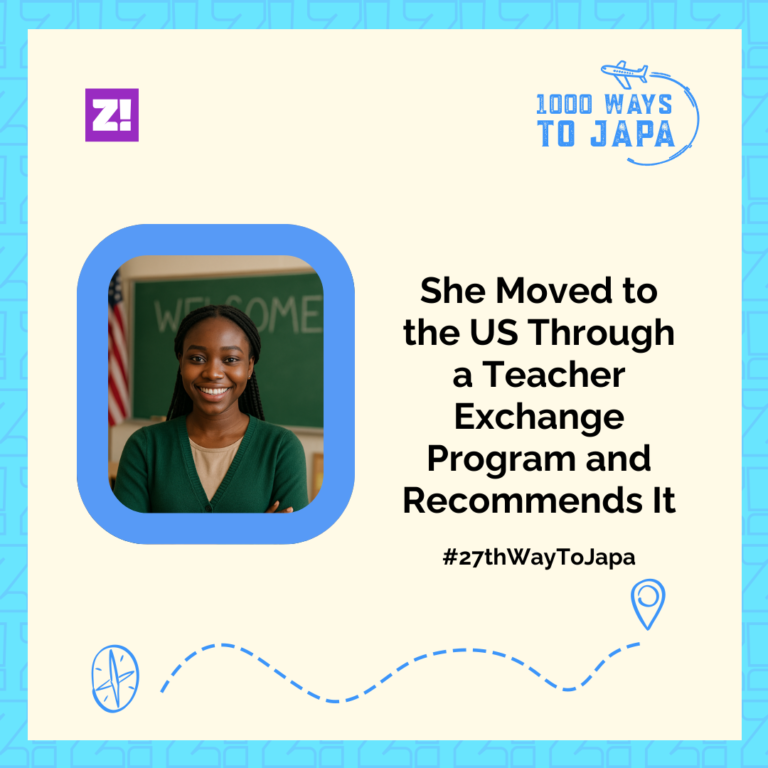Someone you know has left or is planning to leave. 1,000 Ways To Japa will speak to real people and explore the infinite number of reasons and paths they use to get to Japa
Stephanie (26) moved to France in 2023 and never looked back. In this story, she shares how Nigerians can study in France for as low as €150 and enjoy other benefits like discounted rents and subsidized cost of living.
Where do you currently live, and when did you move from Nigeria?
I live in France, and I left Nigeria in September 2023.
France is so random. How did that happen?
I moved through the Language Assistance Program. It’s an opportunity for language students with a solid background in French to spend seven months in France teaching French people how to speak English. The program is open to people from different African countries like Kenya, South Africa, and others. Nigeria joined the program in 2020.
Tell me more about this program
Language assistants work hand-in-hand with teachers in French schools. Our job is mainly to assist students by communicating with them in English. It’s not a full-time role since the program only lasts seven months.
How were you able to stay back in France?
I initially applied to renew my contract but later changed my mind because teaching English wasn’t my long-term goal. I wanted something better, so I applied to universities in France. Thankfully, I got accepted into a university where I’m now pursuing a master’s degree.
Congratulations! Can you describe the process of applying to study in France?
First, I wouldn’t recommend the language assistant program as a relocation strategy because it’s short-term and requires a strong background in French, which many Nigerians don’t have. Instead, I recommend applying directly to universities. France offers English-taught programs, and while you can apply to schools on your own, it’s easier to go through Campus France, which acts as an intermediary for students in Nigeria.
To apply, visit the Campus France website, browse the school catalogues, and find the perfect program. If you get admitted, Campus France will help with your visa application process. A lot of people think they can skip Campus France, but French universities aren’t like UK schools, where you can apply independently. At some point, you’ll need to go through Campus France.
Applications typically open between October and December, and most public schools charge around €250 as school fees. You’ll also have to attend a physical interview in Lagos or Abuja, so keep that in mind.
My case was slightly different because I applied through Mon Master, a platform for foreigners already living in France.
What are some perks of studying in France?
Students in France enjoy several benefits, like scholarship opportunities. Financial aid is also provided upon request for students facing financial challenges. The French government also provides housing assistance through a system called Caisse d’Allocation Familiale (CAF), which covers up to half of your rent. You can apply for CAF once school starts; once approved, the government helps pay your rent.
Schorlaship plus rent? Woah!
Yes. Some schools also offer free healthcare. Plus, there are discounts for students, especially for groceries. My friends and I signed up for a grocery store called Esope, where students get major discounts. You can spend just €5 buying a lot of items. However, you can’t spend more than €12 per week, and some items have limits. There’s also Resto du Cœur, which provides free groceries for students who can prove financial hardship. Once approved, you get a card that allows you to collect food once a week.
How different is the French education system compared to Nigeria?
It’s very different. I attended a federal university in Nigeria, and we barely had access to projectors. Here, all classes are taught with projectors—it’s the standard. Most students use their computers in class, downloading notes instead of writing them down in actual books. The academic calendar is also much faster than in Nigeria.
Let’s break down the costs for Nigerians interested in studying in France.
Public university tuition in France is relatively cheap. Undergraduate programs cost around €150 per year, while master’s programs, which typically last two years, cost €250 annually. However, if you’re coming from Nigeria, you need to prove you have enough funds to support yourself. The French authorities usually require proof of at least €6,000 in your account for your first year.
Securing accommodation from Nigeria can also be tricky. If you have a friend in France, it’s best to ask them to help you sort this out. Otherwise, you might need to book an Airbnb for a month and explain in your visa application that you’ll find permanent housing upon arrival. Showing proof of accommodation is so crucial for visa approval that not having it could lead to rejection.
Is life in France as fancy as it sounds?
It can be, especially in Paris, where there are many English speakers. Paris is not the only cool place in France. The country has other beautiful cities that international students often overlook, like Lille and Strasbourg. Unfortunately, I spent my first year in a small city where most people were either very old or really young, so I barely had friends my age. It was boring.
Has anything surprised you since moving to France?
Oh yes! French people are very open—they have no problem asking personal questions within minutes of meeting you. They’re also very sporty. I learned how to ride a bike here because everyone seems to use bikes for transportation. When I was still a language assistant, I used to ride my bike to school.
Another culture shock is kissing. French people love to kiss on the cheek as a greeting, even to people they’re meeting for the first time. I’m still not a fan because I never know which side to go for, and I’m always scared of accidentally kissing someone on the lips instead of the cheek.
Also, your classmates are just your classmates. In Nigeria, you can make solid friendships in class, but here, people rarely hang out outside school. You can talk in class, but if you see them outside, they might act like they don’t know you. They also won’t invite you to anything social.
LMAO. How hard is it for monolingual Nigerians to fit into the French community?
I know a few Nigerians who don’t speak French, and they survive using Google Translate. It’s possible to figure things out. You can also register for French classes as soon as you arrive.
Have you made friends with other Nigerians in France?
Yes! It was easy for me because I started as an assistant and met other Nigerian assistants. Some of them stayed back, and we maintained our friendships. Luckily, some even got into the same school as me, so we stuck with each other. As I mentioned earlier, French students aren’t very open to friendships outside class, so having Nigerian friends has been a lifesaver. I hope to make more French friends in the future, though.
On a scale of 1 to 10, how happy are you in France?
I’d say a 7. It could be higher, but the administrative process here is frustrating. Whether it’s renewing your visa or job hunting, there’s a high chance you’ll get stressed out dealing with the French process of getting things done.
Want to to share your japa story? Please reach out to me here.




